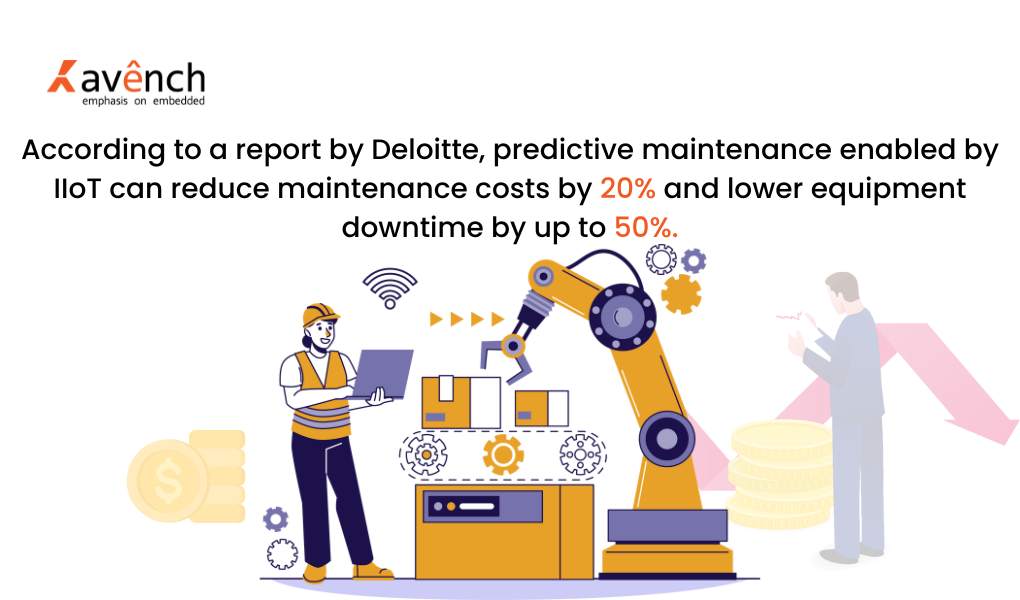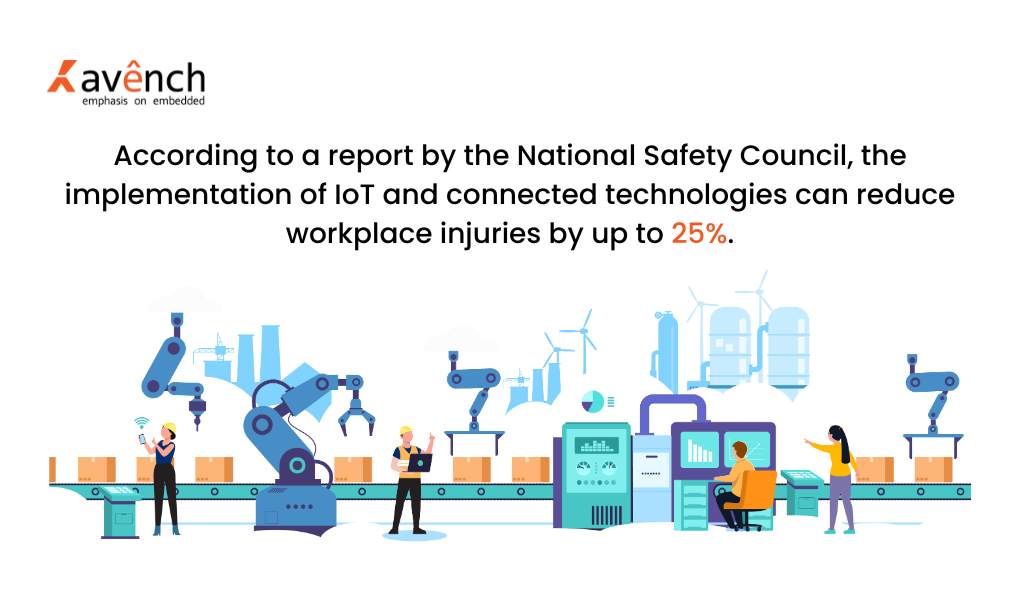The Industrial Internet of Things (IIoT) is making a transformative impact in the world of industrial automation. Its integration into different industries is shaping the future of how businesses operate, providing new levels of efficiency, productivity, and safety. IIoT in industrial automation enhances efficiency, reduces operational costs, and improves safety. By integrating smart sensors and advanced analytics, IIoT enables real-time monitoring, predictive maintenance, and seamless connectivity between devices, optimizing production processes and minimizing downtime. Let’s look at five emerging IIoT applications that are forming the future of industrial automation.
 1. Predictive Maintenance
1. Predictive Maintenance
One of the most critical IIoT applications in industrial automation is predictive maintenance. By using sensors and continuous monitoring of machines through real-time data analysis, their deteriorating conditions can be gauged. This, therefore, allows the maintenance team to mitigate the issue’s potential effect by correcting it before escalation—thus minimizing downtime and reducing maintenance costs. The industrial IIoT gateway is important in this application in that it collects data from the various sensors installed on the machines and finally transmits the data to the cloud for analysis. Maintenance work will only be done when required, not at a fixed time, through this data-driven approach. This enhances the lifespan and performance of the equipment
 2. Asset Tracking and Management
2. Asset Tracking and Management
Asset tracking is a crucial process in industries like manufacturing and logistics because it ensures operational efficiency. IIoT applications will help to keep up-to-date information on asset tracking using technologies such as GPS and RFID. This tracking is further integrated with an industrial IIoT gateway, thus ensuring that enterprises can monitor the location, status, and condition of the assets at any given time. This is not only beneficial for the optimization of resource use but also in preventing theft and loss. Also, asset tracking will give insights into how assets are being used, which should further influence the decision of the business on resource allocation and management.
3. Energy Management
Energy consumption represents one of the major cost factors in many industries. Advanced energy management through the IIoT in industrial automation can monitor the pattern of energy consumption and bring wastage into focus. Smart meters and sensors connected via an industrial IIoT gateway collect data on energy consumption in real-time. The collected data is then used to analyze, thus optimizing energy consumption, reducing costs, and increasing sustainability. For instance, applications based on the IIoT within the manufacturing plant can assist in the regulation of machine and lighting operations following the need at that very moment, thereby reducing unnecessary energy use.
4. Smart Manufacturing
Another area where IIoT can have great potential is in smart manufacturing. An industrial IIoT gateway interconnects machines, systems, and humans. This level of interconnectivity can enable automation of production and more efficient operations. IIoT applications can enable the process of monitoring and controlling the real production process in real time so that every step is optimized for maximum production. And in interconnected systems, adaption to changes of demand, production scheduling, and other variables can be immediate. On the whole, these applications will lead to more flexible and responsive manufacturing processes.
Such data, when collected, will also constantly enable process improvement to produce quality goods and reduce wastage
 5. Improved Safety and Compliance
5. Improved Safety and Compliance
Safety is paramount within industrial environments, and IIoT applications are now offering new ways to further improve safety within the workplace and adhere to regulations. Wearable devices and sensors can monitor the health and safety of the workforce in real time, detecting hazardous conditions, such as harmful gas exposure or extreme temperatures. Industrial IIoT gateways support the integration of these devices into central monitoring systems, wherein alerts and responses to potential safety threats can be raised immediately. Furthermore, IIoT applications can help companies remain compliant with industry standards through the automatic recording and reporting of data specific to the industry, which can significantly reduce the risk of human errors and ensure that all safety protocols are followed.
Conclusion
IIoT integration within industrial automation has been marked with significant advancements in the fields of efficiency, productivity, and safety. Predictive maintenance, asset tracking and management, energy management, and smart manufacturing for enhanced safety are just a few of the emerging IIoT in industrial automation transforming industries today. The technologies of the day, in a continual state of evolution, have a far-reaching potential for innovation and improvement in the operations of industries. Businesses that embrace IIoT solutions will gain a competitive advantage by benefiting from numerous IIoT application advantages.
In summary, the future of industrial automation is being shaped by the widespread adoption of IIoT applications. Businesses can be at the forefront of new levels of connectivity and data-driven decision-making with the help of industrial IIoT gateways. As all this comes into industrial usage, the landscape of industrial automation will be forever changed, making work more efficient, safe, and sustainable. The time to harness the power of IIoT is now, and the benefits it brings are just beginning to be realized.
Avench is one of the leading embedded product design companies in usa. For any sales queries, contact us at +1 (775) 404-5757. You can also email us at sales@avench.com. We will be happy to assist you.
<
 1. Predictive Maintenance
1. Predictive Maintenance 2. Asset Tracking and Management
2. Asset Tracking and Management 5. Improved Safety and Compliance
5. Improved Safety and Compliance